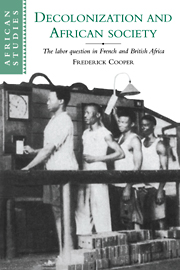Book contents
- Frontmatter
- Contents
- List of tables and figure
- Preface
- List of abbreviations
- Map of French and British colonial Africa
- 1 Introduction
- Part I The dangers of expansion and the dilemmas of reform
- Part II Imperial fantasies and colonial crises
- Part III The imagining of a working class
- Part IV Devolving power and abdicating responsibility
- Conclusion
- 13 The wages of modernity and the price of sovereignty
- Notes
- Bibliography
- Index
- OTHER BOOKS IN THE SERIES
13 - The wages of modernity and the price of sovereignty
Published online by Cambridge University Press: 22 February 2010
- Frontmatter
- Contents
- List of tables and figure
- Preface
- List of abbreviations
- Map of French and British colonial Africa
- 1 Introduction
- Part I The dangers of expansion and the dilemmas of reform
- Part II Imperial fantasies and colonial crises
- Part III The imagining of a working class
- Part IV Devolving power and abdicating responsibility
- Conclusion
- 13 The wages of modernity and the price of sovereignty
- Notes
- Bibliography
- Index
- OTHER BOOKS IN THE SERIES
Summary
Imaginative projects have material consequences. The imagining of an African working class within colonial bureaucracies – and the larger act of imagining that European modernity could be transported to the colonies – affected the conditions of work of a designated segment of the laboring population, and it opened up political possibilities which the African labor movement was to a significant extent able to seize.
The multiple consequences of the experiment thereafter had to be faced by newly independent governments, by politicians, civil servants, and union leaders whose habits and expectations had been affected by the confrontations of the final decade of colonial rule. It is not very fruitful to look for a “legacy” which colonial rule left to future generations, for – important as are the conjunctures when key questions open up to wider debate – the consequences of any historical process are liable to be redirected or seized at any moment along the way. This book has been concerned with the reshaping of a political framework in which a social question is debated, and such a framework was both affected by many specific struggles and itself affected similar struggles. A full analysis of the effects of the reframing of the labor question should take into account the dynamics of post-colonial history and the intricacies of each context in which questions of labor were contested.
- Type
- Chapter
- Information
- Decolonization and African SocietyThe Labor Question in French and British Africa, pp. 457 - 472Publisher: Cambridge University PressPrint publication year: 1996

